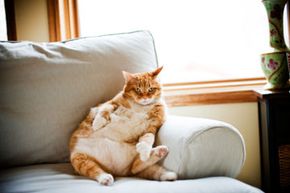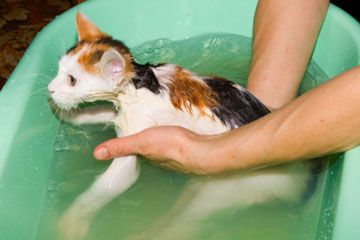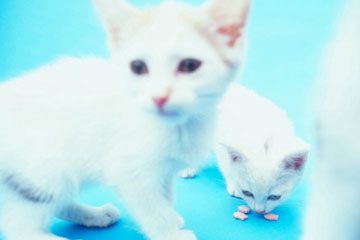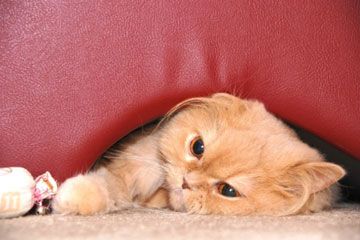Fat cats may be cute, but there's nothing cute about being at a higher risk for life-threatening conditions like diabetes and heart disease. Cat owners often feel defensive about their larger kitties and say that there's nothing they can do, but that's rarely the case. How do you know if your cat needs to drop some weight? It can be difficult to accurately weigh your cat at home, but you can tell by feeling his ribs. If you can find them easily, then your cat is probably at a normal weight. If you have to "dig" a little through pads of fat, your cat may be overweight. If he has a belly, that's also a sign.
Your cat should be weighed at every vet visit. Since cats usually weigh somewhere between eight and ten pounds, a cat that tips the scales at more than 12 pounds is probably carrying too much weight. Obesity is usually defined as being 15 percent or more over the average body weight. The heavier your cat is -- and the longer he is overweight -- the greater the risks to his health. Of course you want your cat to live a long, healthy life, so if you suspect that your cat is overweight, there's no time like the present for getting him down to a normal weight.
Advertisement
It's probably a good idea to talk to your vet before you begin a home weight-reduction program for your cat, just to make sure that there's nothing else going on with his health. In addition, any cat that begins looking plumper in a very short period of time needs to see the vet as soon as possible. Quick weight gain can be a sign of very serious illness.
Keep in mind that your cat didn't get fat overnight -- it took months or years. Gradual weight loss lets his body adjust to the changes and puts less stress on his internal organs. Never put a cat on a starvation diet; starvation and rapid weight loss can trigger a fatal liver disease.
We'll look at some ways that you can help turn your fat cat into a healthy one in the next section.
Advertisement



